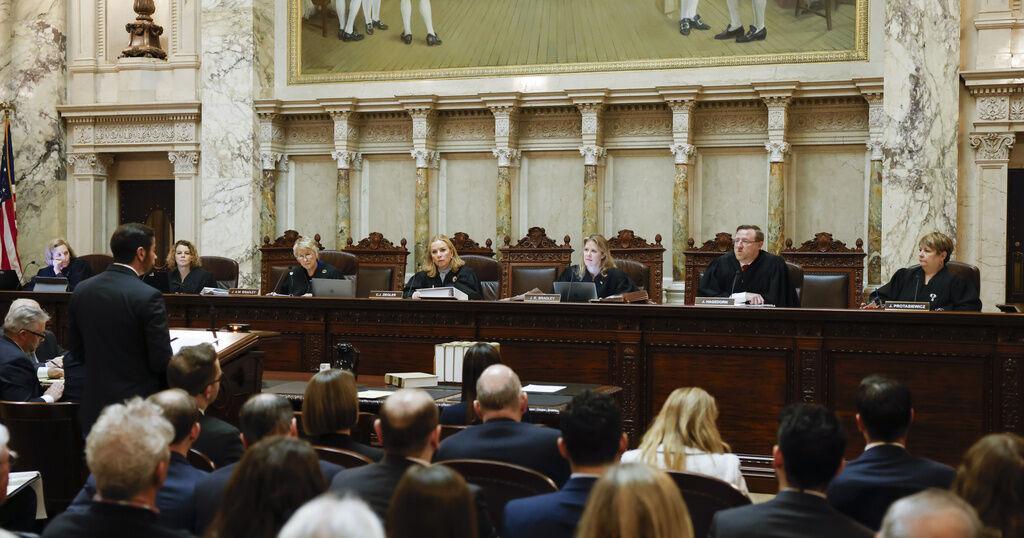JEFFERSONVILLE — An agreement has been reached between the Jeffersonville Redevelopment Commission and the Southern Indiana Tourism Bureau regarding the property where the bureau’s offices and visitor center used to be.
City attorney Les Merkley explained the situation during the commission’s meeting Wednesday with the original bureau offices and visitor center located at 305 and 315 Southern Indiana Ave.
He said the building was auctioned at a public sale, and they entered into a purchase agreement with the winning bidder.
SoIN Tourism Executive Director Jim Epperson said a title search was ordered before the start of the auction of the property, but they didn’t receive the results until the end of the auction on Dec. 12, 2023, where they saw the reversion clause.
Epperson said the deed to the property contained a reversion clause that was written in 1996 that states that when the tourism bureau leaves the property, it reverts back to the commission. He said the property was originally sold to the bureau from the commission for $1.
“It was really a protection for both organizations back then,” Epperson said about the clause.
Merkley and Jeffersonville Mayor Mike Moore said discussions were made and agreement was reached between the commission and bureau.
“I’m satisfied with these terms,” Moore said at the meeting.
The tourism bureau will revert the property back to the commission, which will then be sold. Around $396,000 will go toward the commission, while the bureau will receive $455,000.
“I think the portion that we’re getting recognizes the investment that we’ve made over the years, but also respects the original ownership of the redevelopment commission,” Epperson said.
He said the property will be sold to Neace Ventures, and the closing of the sale will occur by the end of April. He said he thanks the attorneys that worked on this agreement with the city and bureau.
“We had great use of that property for 27 years,” Epperson said.
In February, the bureau moved to an office in downtown Jeffersonville at 228 Spring St., Suite 106. Epperson said there has been an “automatic uptick” of foot traffic to the visitor center particularly with residents.
“When that foot traffic really starts taking off with people crossing the bridge and events on the river stage, we know it’s going to be a great location for us,” he said.
PHILADELPHIA — When the Taliban gained control of Afghanistan in 2021, Jawad Moradi feared he would be put in prison, or worse.
Five years earlier, he had earned his master of laws degree at Duke University. Because of his U.S. legal education and interaction with colleagues in the United States and elsewhere, he was at risk. And as a member of a minority population that had been targeted by the Taliban, he was even more vulnerable.
kAm“x 925 E@ 9:56 >JD6=7 😕 >J 9@FD6[” 96 D2:5]k^Am
kAmqFE @?6 52J[ 5C6DD65 😕 5C23 4=@E96D E@ 6D42A6 56E64E:@?[ 96 2?5 9:D H:76 EC2G6=65 2 C:D<J C@FE6 =:?65 H:E9 %2=:32? 4964<A@:?ED[ 7C@> z23F= E@ 2 ?@CE96C? AC@G:?46[ H96C6 2? 6G24F2E:@? 7=:89E 2CC2?865 3J 2 56AFEJ 5:C64E@C 2E 2 &]$] F?:G6CD:EJ 4@==23@C2E:G6 2H2:E65 9:>]k^Am
kAmw6 7@F?5 9:>D6=7 😕 2 C67F866 42>A 😕 E96 &?:E65 pC23 t>:C2E6D 2?5 ?62C=J 2 J62C =2E6C 😕 E96 &?:E65 $E2E6D[ 2E E96 &?:G6CD:EJ @7 !6??DJ=G2?:2’D r2C6J {2H $49@@=]k^Am
kAm“(92E H@F=5 x 5@ :7 x 5:5?’E 92G6 E9:D DFAA@CE 7C@> !6??n” |@C25:[ bd[ @7E6? H@?56CD]k^Am
kAm|@C25: 😀 @?6 @7 D:I “2E\C:D< D49@=2CD” E92E !6?? 92D 3C@F89E E@ 42>AFD D:?46 :ED !6?? v=@32= @77:46 =2F?4965 2 ?6H AC@8C2> 😕 a_a`] %96 F?:G6CD:EJ 925 AC6G:@FD=J 96=A65 D49@=2CD[ 3FE E96 4C:D:D 😕 p7892?:DE2? D9@H65 E96 ?665 7@C 2 >@C6 4@@C5:?2E65[ 4@?46CE65 677@CE[ D2:5 $4@EE |@@C6[ AC24E:46 AC@76DD@C @7 A@=:E:42= D4:6?46 H9@ @G6CD66D E96 AC@8C2>]k^Am
kAm%96 @E96C 7:G6 D49@=2CD 4@>6 7C@> p7892?:DE2?[ 2D H6== 2D ‘6?6KF6=2 2?5 &<C2:?6[ |@@C6 D2:5]k^Am
kAm!6?? v=@32= AC@G:56D Sb_[___ 2??F2= DE:A6?5D 7@C FA E@ EH@ J62CD[ 2?5 E96 D49@@= @C 56A2CE>6?E 9@DE:?8 E96 D49@=2C 😀 6IA64E65 E@ >2E49 :E] %96 2AAC@I:>2E6 Se_[___ 96=AD H:E9 9@FD:?8 2?5 @E96C 6IA6?D6Dj E96J 2=D@ 86E @77:46 DA246] !6?? v=@32= 2=D@ 2DD:DED H:E9 G:D2 2AA=:42E:@?D]k^Am
kAm“*@F 42?’E 5@ =@ED 2?5 =@ED @7 A6@A=6[ 3FE J@F 42? >2<6 2 5:776C6?46[” D2:5 tK6<:6= y] t>2?F6=[ G:46 AC@G@DE 7@C 8=@32= :?:E:2E:G6D]k^Am
kAmqC:?8:?8 😕 E96 D49@=2CD 2=D@ 36?67:ED !6?? 724F=EJ 2?5 DEF56?ED[ 96 D2:5[ 8:G:?8 E96> 2 “H:56C G:6H @7 E96 D49@=2CD9:A 92AA6?:?8 😕 @E96C 4@F?EC:6D]”k^Am
kAm%96 D49@=2CD 5@?’E ?646DD2C:=J 92G6 E@ 36 DEF56?ED @C AC@76DD@CDj E96J 42? 36 AF3=:4 :?E6==64EF2=D[ >FD:4:2?D[ 2CE:DED[ ;@FC?2=:DED[ A@=:E:4:2?D[ “2?J@?6 H9@D6 AC6D6?46 H@F=5 255 E@ E96 E6249:?8[ C6D62C49 2?5 D6CG:46 >:DD:@?D @7 E96 F?:G6CD:EJ[” |@@C6 D2:5]k^Am
k9bm!2CE @7 2 ?2E:@?2= 677@CE E@ C6D4F6 D49@=2CDk^9bm
kAm%96 !6?? AC@8C2> 7:ED :?E@ 2 =2C86C 677@CE 3J F?:G6CD:E:6D E@ @776C C67F86 E@ D49@=2CD H9@D6 =:G6D @C H@C< 2C6 6?52?86C65 😕 E96:C 9@>6 4@F?EC:6D]k^Am
kAm%96 x?DE:EFE6 @7 x?E6C?2E:@?2= t5F42E:@?[32D65 😕 }6H *@C< r:EJ[ CF?D E96 =2C86DE AC@8C2> 😕 E96 ?2E:@? 7F?565 E9C@F89 2 Sda >:==:@? 6?5@H>6?E[ 8C2?ED 2?5 5@?@CD] $E2CE65 😕 a__a[ :E 92D 96=A65 `[`_e D49@=2CD 7C@> ea 4@F?EC:6D 7:?5 ?6H 24256>:4 9@>6D 2E d_a :?DE:EFE:@?D H@C=5H:56]k^Am
kAmx? a_ab[ E96 :?DE:EFE6 C646:G65 ?62C=J fd_ 2AA=:42E:@?D 2?5 2H2C565 `af 76==@HD9:AD[ D2:5 |2C< p?86=D@?[ E96 :?DE:EFE6’D 3@2C5 492:C]k^Am
kAmqFE 6G6? 367@C6 E92E[ E96 :?DE:EFE6 @? 2 =6DD 7@C>2= 32D:D H2D 96=A:?8 D49@=2CD[ :?4=F5:?8 E9@D6 A6CD64FE65 3J E96 }2K:D 2?5 E2C86E65 3J E96 q@=D96G:< A2CEJ 😕 #FDD:2[ 96 D2:5]k^Am
kAm“(6 2=H2JD 925 E96 :562 E92E E96 4C:D:D H@F=5 36 @G6C[ E96 H2C H@F=5 36 @G6C[” D2:5 p==2? t] v@@5>2?[ E96 :?DE:EFE6’D 49:67 6I64FE:G6 @77:46C] “xE C62==J H2D?’E F?E:= E96 >:==6??:F>[ H6 C62=:K65 E9:D 😀 2 A6C>2?6?E DE2E6 @7 E96 H@C=5] (6 36EE6C 86E C625J E@ 5@ E9:D 8=@32==J 2?5 A6C>2?6?E=J]”k^Am
kAm%96 :?DE:EFE6 2E 2?J 8:G6? E:>6 😀 DFAA@CE:?8 23@FE `ad D49@=2CD[ H9@ >@DE @7E6? 4@>6 H:E9 E96:C 72>:=:6D] %96J C646:G6 G:D2 2?5 EC2G6= DFAA@CE[ 2 DE:A6?5 2?5 2DD:DE2?46 H:E9 7:?5:?8 9@FD:?8 2?5 25;FDE:?8 E@ E96:C ?6H 4@>>F?:EJ] p3@FE 92=7 C6EFC? E@ E96:C 4@F?EC:6D 27E6C E96 E9C62E A2DD6D[ v@@5>2? D2:5]k^Am
kAmqFE D@>6 DE2J] $2=2> p= zF?E2C2[ 2? 2C4926@=@8:DE H9@ 25G@42E6D 7@C E96 AC@E64E:@? 2?5 AC6D6CG2E:@? @7 4F=EFC2= 96C:E286 D:E6D 😕 96C 9@>6 4@F?ECJ @7 $JC:2[ 3642>6 2? 2DD:DE2?E AC@76DD@C @7 4=2DD:4D 2E #FE86CD 27E6C 96C E:>6 2D 2 D49@=2C 2E !6??]k^Am
kAm~E96C !9:=256=A9:2\2C62 4@==686D E92E 92G6 9@DE65 D49@=2CD E9C@F89 E96 :?DE:EFE6’D AC@8C2> :?4=F56 !6??[ #FE86CD[ sC6I6=[ %6>A=6[ pC425:2 2?5 ‘:==2?@G2[ p?86=D@? D2:5]k^Am
k9bm‘x 42? @C56C 2=>@DE 2?JE9:?8’k^9bm
kAm!2G6= v@=F36G[ bh[ 2 #FDD:2? 2CE 9:DE@C:2?[ 925 366? 9625 4FC2E@C 2E 2 >FD6F> 😕 &<C2:?6 H96? #FDD:2 :?G2565 😕 a_aa] w6 925 =67E #FDD:2 27E6C AF3=:D9:?8 E96 5:2C:6D @7 z@?DE2?E:? $@>@G[ 9:89=:89E:?8 E96 A2:?E6C’D 9@>@D6IF2=:EJ[ 2 A2CE @7 9:D =:76 E92E 925 366? D:=6?465 😕 #FDD:2]k^Am
kAmw6 925 366? :?G:E65 E@ E96 ~56DD2 u:?6 pCED |FD6F> 😕 &<C2:?6 H96C6 96 925 4C62E65 2? 6I9:3:E:@? @? $@>@G 2?5 H2D =2E6C @776C65 2 7F==\E:>6 A@D:E:@? E96C6]k^Am
kAmv@=F36G 2=C625J <?6H y@?2E92? s] z2EK[ 2? 2DD@4:2E6 AC@76DD@C @7 AC24E:46 2E !6?? 😕 9:DE@CJ @7 2CE 2?5 86?56C[ D6IF2=:EJ 2?5 H@>6?’D DEF5:6D] z2EK 925 4@?E24E65 v@=F36G H96? 96 H2D AFEE:?8 E@86E96C “%96 u:CDE w@>@D6IF2=D[” 2? 6I9:3:E:@? E92E @A6?65 @? 2 D>2== D42=6 😕 r9:428@ 2 4@FA=6 @7 J62CD 28@ 2?5 H:== 92G6 2 =2C86C 563FE ?6IE J62C] w6 H2D >2CD92=:?8 2 8C@FA @7 D49@=2CD 7C@> 2C@F?5 E96 H@C=5 E@ 96=A H:E9 E96 6I9:3:E:@?[ H9:49 49C@?:4=6D E96 62C=:6DE 2AA62C2?46D @7 D6IF2= 5:776C6?46 😕 2CE]k^Am
kAmz2EK H2D H@CC:65 23@FE v@=F36G 😕 E96 &<C2:?6 2?5 @776C65 E@ 3C:?8 9:> E@ !6??] v@=F36G H2D 96D:E2?E E@ =62G6 F?E:= 96 4@F=5 2DDFC6 E96 H@C<D 2E ~56DD2 H6C6 D276[ 3FE 6G6?EF2==J 42>6 E@ !9:=256=A9:2 😕 pF8FDE a_aa] v@=F36G 7@F?5 2? 2A2CE>6?E[ 2?5 z2EK’D 4@==628F6D AC@G:565 E96 ?646DD2CJ 7FC?:D9:?8 2?5 DFAA=:6D]k^Am
kAm“x 92G6 7FC?:EFC6 H:E9 2 9:DE@CJ 2?5 AC@G6?2?46[” v@=F36G D2:5 AC@F5=J[ D:EE:?8 😕 E96 9:DE@CJ 56A2CE>6?E @77:46 96 D92C6D H:E9 z2EK]k^Am
kAmw6 AC6D6?E65 9:D C6D62C49 @? $@>@G 2E 2 !6?? 4@==@BF:F> E92E s646>36C 2?5 4@?E:?F6D E@ H@C< H:E9 z2EK @? E96 FA4@>:?8 6I9:3:E:@?] w6 2=D@ 4@?5F4ED 2 C625:?8 8C@FA 7@C 5@4E@C2= DEF56?ED @? BF66C DEF5:6D 😕 2CE 9:DE@CJ]k^Am
kAm“%96 AC@8C2> 5:5 H92E :E H2D DFAA@D65 E@ 5@[ H9:49 H2D E@ 86E D49@=2CD 2E C:D< @FE @7 52?86C[” z2EK D2:5]k^Am
kAmz2EK D2:5 E9C@F89 v@=F36G[ 96 92D =62C?65 23@FE E96 =2C86 #FDD:2? $=2G:4 ?6:893@C9@@5 😕 }@CE962DE !9:=256=A9:2i “xE C62==J H2D H:=5[” 96 D2:5] “x 76=E =:<6 x H2D D@>69@H 😕 t2DE6C? tFC@A6]”k^Am
kAmv@=F36G H2D 2>2K65 2E E96 2446DD E@ 2 H:56 2CC2J @7 >2E6C:2=D E9C@F89 !6??’D =:3C2C:6D] “x 42? @C56C 2=>@DE 2?JE9:?8[” 96 D2:5]k^Am
kAmw6 9@A6D E@ 7:?5 H@C< 2?5 DE2J 😕 E96 &?:E65 $E2E6D 27E6C 96 4@>A=6E6D E96 D49@=2C AC@8C2>]k^Am
k9bm‘|2J36 x D9@F=5 5@ D@>6E9:?8’k^9bm
kAmy6DúD u6C?á?56K\’:==2G6C56[ 2 AC@76DD@C @7 64@?@>:4D[ 962C5 23@FE p?86= p=G2C25@ 7C@> 2 >FEF2= 7C:6?5 H96? 96 H2D G:D:E:?8 2 F?:G6CD:EJ 😕 $A2:?] p=G2C25@[ 9:D 7C:6?5 E@=5 9:>[ H2D 2 ‘6?6KF6=2? 4@?8C6DD>2? 2?5 64@?@>:DE H9@ 925 366? 25G@42E:?8 7@C 56>@4C24J 2?5 :>AC@G65 64@?@>:4 A@=:4J 😕 E96 4@F?ECJ] ‘6?6KF6=2[ u6C?á?56K\’:==2G6C56 D2:5[ 92D 925 E96 H@C=5’D =2C86DE 4@==2AD6 @7 vC@DD }2E:@?2= !C@5F4E 😕 E96 =2DE `__ J62CD 😕 2 4@F?ECJ E92E H2D ?@E 2E H2C]k^Am
kAm“xE H2D ?@E 8@:?8 H6== 7@C 9:>[” u6C?á?56K\’:==2G6C56 D2:5]k^Am
kAmp=G2C25@[ cb[ 925 366? 362E6? 3J A@=:46 2?5 2 7C:6?5 5:65 F?56C DFDA:4:@FD 4:C4F>DE2?46D H9:=6 😕 A@=:46 4FDE@5J 😕 a_`g[ 96 D2:5]k^Am
kAm“x E9@F89E >2J36 x D9@F=5 5@ D@>6E9:?8[” u6C?á?56K\’:==2G6C56 D2:5]k^Am
kAmp=G2C25@ 92D DA6?E E96 =2DE EH@ J62CD 2E !6??] w6 92D 4@\E2F89E 2? @?=:?6 4@FCD6 @? E96 64@?@>:4 9:DE@CJ @7 {2E:? p>6C:42 2?5 :?E6CG:6HD $A2?:D9\DA62<:?8 64@?@>:DED 7@C 2 A@542DE] w6 2=D@ 7:?:D965 9:D 5:DD6CE2E:@?]k^Am
kAmp=G2C25@ H2?ED E@ C6EFC? E@ ‘6?6KF6=2 :7 E96C6 😀 2 C68:>6 492?86]k^Am
kAm“!9:=256=A9:2 7@C >6 92D 366? w62G6? 😕 2 D6?D6[” 96 D2:5] “!6?? 😀 2 E@A F?:G6CD:EJ]]] H:E9 E@A 24256>:4 AC@76DD@CD[ C6D62C496CD]]] 2?5 E96 DEF56?ED 2C6 E@A DEF56?ED 😕 E6C>D @7 249:6G6>6?E 2?5 :562D[ A6@A=6 H9@ H2?E E@ 492?86 E96 H@C=5]”k^Am
k9bm‘yFDE 5C62>:?8’k^9bm
kAmu@C |@C25:[ :E H2D z2C6? w2==[ 56AFEJ 6I64FE:G6 5:C64E@C 2E E96 #F=6 @7 {2H r@==23@C2E:G6 2E E96 &?:G6CD:EJ @7 $@FE9 r2C@=:?2[ H9@ 96=A65 2CC2?86 9:D E:>6 2E !6??] $96 H2D 2DD:DE:?8 D6G6C2= 5@K6? D49@=2CD 86E 7C@> p7892?:DE2? E@ &]$] F?:G6CD:E:6D] $96 C624965 tC:4 u6=5>2?[ 56AFEJ 562? 7@C :?E6C?2E:@?2= AC@8C2>D 2E !6?? r2C6J {2H]k^Am
kAmu6=5>2? D2:5 |@C25: “D9@H65 FA H:E9 2 D>:=6 @? 9:D 7246” 2?5 2D<65 9@H 96 4@F=5 C6A2J !6??] |@C25: E9@F89E 96 H@F=5 92G6 E@ 5@ C6D62C49 @C 4@>A=6E6 @E96C D49@=2C=J 5FE:6D]k^Am
kAmxE H2D E96 @?=J H2J 7@C |@C25: E@ C6>2:? 😕 E96 &?:E65 $E2E6D 2?5 H@C< 2D 2 =2HJ6C]k^Am
kAm|@C25: A2DD65 E96 }6H *@C< q2C =2DE J62C 2?5 8@E 2 ;@3 2E 2 7:?2?4:2= 4@>A2?J 😕 s6=2H2C6] w6’D 2=C625J 366? AC@>@E65 2?5 D6CG6D 2D 4@CA@C2E6 4@F?D6=] w6 2?5 9:D H:76 =:G6 😕 !9:=256=A9:2]k^Am
kAm“$@>6E:>6D[” 96 D2:5[ “x E9:?< >2J36 x’> ;FDE 5C62>:?8]”k^Am
kAmk6>mU4@AJja_ac %96 !9:=256=A9:2 x?BF:C6C[ {{r] ‘:D:E 2E k2 9C67lQ9EEAi^^:?BF:C6C]4@>Qm:?BF:C6C]4@>k^2m] s:DEC:3FE65 3J %C:3F?6 r@?E6?E p86?4J[ {{r]k^6>mk^Am
Marquette Savings Bank of Erie has announced plans to sell one of its two Meadville banking properties to a neighboring, non-banking business.
The bank intends to sell its drive-thru-only branch property at 349 North St. to Country Fair Inc., the Erie-based convenience store chain. The branch will close down at 6 p.m. March 29.
Country Fair Inc., with 72 convenience stores located in Pennsylvania, Ohio and New York, has two Meadville-area locations.
Country Fair’s locations are at 18163 Conneaut Lake Road in Vernon Township, and 333 North St., the intersection of North and North Main streets, in Meadville. Its North Street location abuts the Marquette’s drive-thru-only office on North Street.
“Country Fair has been exploring the potential for additional parking and storage at its location on North and Main streets,” Steve Danch, chairman of Marquette’s board of trustees, said in a statement.
Country Fair Inc. officials did not return Meadville Tribune emails and telephone messages on Thursday and Friday requesting comment about its plans or a timeline for any changes.
On Jan. 18, the Meadville Zoning Hearing Board did approve a request for a special exception for 349 North St. to serve as additional parking and additional storage space for Country Fair’s North Street location. Approval of the special exception was required for the potential land sale to move forward.
Marquette will maintain its Meadville full-service walk-in and drive-thru location at 1075 Park Ave., Danch said. The two bank branches are about three-quarters of a mile apart.
“With a full-service Marquette branch located nearby on Park Avenue, this sale offers Marquette an opportunity to support and benefit the Meadville community while maintaining a strong presence to serve our customers here,” Danch said.
No banking jobs will be lost as the North Street employees may transfer to other Marquette locations in the Meadville area, Danch said.
In addition to Park Avenue, the bank has another full-service office in the Meadville area at 16272 Conneaut Lake Road in Vernon Township.
The Catholic Church’s shrinking physical presence in Western New York will get even smaller when the Buffalo Diocese sells off valuable real estate to help settle sex abuse claims.
The diocese, which four years ago today filed for Chapter 11 protection, has identified 22 properties, including its longtime headquarters, it may sell to generate funds toward a settlement of the roughly 900 claims in federal bankruptcy court.
But aside from that development, there’s little indication the diocese is close to reaching a deal with the Official Committee of Unsecured Creditors, which represents about 900 people who said they were sexually abused as children by Catholic priests or other diocese employees.
The bankruptcy case, filed Feb. 28, 2020, already has taken longer to resolve than any other diocese reorganization except for the Archdiocese of Milwaukee’s, which took nearly five years.
People are also reading…
While Buffalo Diocese officials and an attorney for the creditors committee declined to comment on their mediated settlement talks, abuse victims expressed dismay over the pace of negotiations.
“They’re nowhere,” said Kevin Brun, whose 2019 lawsuit alleging the Rev. Arthur Smith molested him when he was a teenager has been stalled in state court due to the bankruptcy. “I’ve been reflecting on how long this bankruptcy process is taking, and my frustration level, it can’t be measured. And I’m sure other survivors – in fact I know other survivors who I’ve spoken to that are extremely frustrated as well.”
The diocese has wracked up nearly $14 million in legal bills, while those who filed abuse claims in bankruptcy court have yet to see a penny.
“I don’t see where the sense of urgency or where the incentive is for these bankruptcy attorneys to settle these cases. I mean, they’re getting paid right along, regardless of what the final outcome is,” said Brun, who also has a claim in the diocese bankruptcy case. “I just don’t think they’re pushing hard enough or negotiating strong enough to bring this to fruition.”
Michael Whalen, who says he was sexually abused by a priest, the Rev. Norbert Orsolits, as a teenager, sits for a portrait at his home in South Buffalo, Feb. 23, 2023.
Michael F. Whalen Jr. said he was hoping Chief Judge Carl L. Bucki of U.S. Bankruptcy Court in the Western District of New York will soon allow at least some Child Victims Act lawsuits to proceed in state court, as a prod for negotiations to move forward.
Bucki decided in January to keep Child Victims Act lawsuits against Catholic parishes and schools on hold until at least April 15.
“It’s just too long. Too many people are passing away,” said Whalen, whose news conference in 2018 alleging abuse by the Rev. Norbert Orsolits led to the unraveling of the diocese’s historical cover-up of clergy sex abuse cases. “I feel sorry for the survivors that have passed and haven’t see closure.”
The diocese’s announcement in court papers last October that it would offer at least $100 million toward a settlement elicited mostly scoffs – both from abuse victims who said it was a paltry amount to address their pain and suffering and from parishioners furious over having to pay for church leadership’s mishandling of abusive clergy.
Properties will be sold
To get there, the diocese will have to sell at least some of its property.
Already on the market is the former Christ the King Seminary, a sprawling campus of 18 buildings on 117 acres in the Town of Aurora, with an asking price of $5.3 million.
Three potential buyers for the property emerged in 2020 after the seminary closed. One was the Masonic Care Community, which was prepared to make a cash offer, according to a trustee. The diocese put off plans for the sale at the time due to demands of the Chapter 11 process. The Masonic Care Community was still interested in the property but also was busy with other projects at the moment, said the trustee, Christopher Hough.
Other diocese properties have yet to be listed but have been named in court papers as likely targets for sales. The most prominent is the Catholic Center, the diocese’s longtime headquarters at 785 and 795 Main St. The five-story former home of the Courier Express newspaper was built in 1929 and has an estimated full market value of $6.7 million, according to City of Buffalo property records.
An Our Lady of Victory administrative building at 780 Ridge Road in Buffalo.
Also on the list of properties to be marketed: three Newman Centers located near university or college campuses in Buffalo, Amherst, and Alfred; three priest retirement homes; a home for expectant mothers and mothers with newborns; a center for families of patients being treated at nearby hospitals; and a large office building in Lackawanna that houses the administrative operations of Our Lady of Victory Charities. About 30 retired priests live in the three homes in Tonawanda, Depew and Lackawanna.
The Catholic Diocese of Buffalo’s priest retirement home at 10 Rosary Avenue in Lackawanna.
Appraisals were conducted last week of the UB Newman Center at 495 Skinnersville Road in Amherst and a condominium on Bristol Drive that’s home to the Rev. Paul D. Seil, UB Newman Center director, Seil said in a weekly newsletter posting on Sunday.
The University at Buffalo Newman Center in Amherst.
“While I have been informed numerous times that the condo will be sold (to help fund the settlement to the victims of clergy abuse and the cover-up), that does not mean the same for the Newman Center!” Seil said in the newsletter. He declined to comment further on Tuesday.
Construction of the UB Newman Center was completed in 2010 at a cost of $2.7 million.
Sales of the properties would further reduce the local Catholic Church’s vast Western New York real estate empire, which has shrunk dramatically over the past 15 years as dozens of churches and elementary schools closed due to declining church attendance and school enrollments and fewer priests.
Through a diocese spokesman, Bishop Michael W. Fisher declined requests to be interviewed for this story. In a video posted Tuesday to the diocese website, he acknowledged that Western New York Catholics “must address the realization that we have more parishes than we need for our Catholic population.”
“The reality is buildings are closing,” said Fisher, “but the church, the people of God, will continue.”
Most recently, All Saints Catholic Church in Buffalo’s Riverside neighborhood and St. Andrew Church and school in the Town of Tonawanda were slated to be closed later this year and will likely be put on the market. While those properties are owned by parishes, which are separate non-profit corporations, their sales ultimately will benefit a settlement trust because the parishes owed the diocese hundreds of thousands of dollars in “assessments,” a regular diocesan tax on weekly offertory collections.
But Fisher also said in his video that the recent closures “are not a direct result of our ongoing Chapter 11 proceedings” and instead were connected to “wider societal trends that span long before our recent problems,” such as migration of local Catholics to other parts of the country, smaller families and people identifying as spiritual but not religious.
The diocese and parishes have discussed additional assessments of all parishes as part of funding a settlement but “no actions have been taken at this time and cannot be taken until the bankruptcy court renders its decision,” he said.
Bucki in January allowed the diocese to hire Hanna Commercial Real Estate as real estate broker for the 22 properties.
“We have the big list, but we’re not authorized to market any of them,” except for the seminary, said William K. Heussler, licensed associate real estate broker with Hanna.
Heussler said his office will be directed by the court about what properties to list and when.
“I don’t know procedurally what they do and how they deem those ready to sell,” he added.
The diocese is required under bankruptcy proceedings to monetize its assets for the purposes of paying its creditors, but it doesn’t necessarily mean that it must sell all properties.
In some instances, a loan may be taken against the value of a property, with the loan proceeds used to pay into a settlement trust.
The 22 properties on the diocese’s revised list do not include five Catholic high school buildings that were part of previous diocese property lists.
Bishop Timon-St. Jude High School in South Buffalo, St. Mary’s High School in Lancaster, Cardinal O’Hara High School in the Town of Tonawanda, Notre Dame High School in Batavia and the former DeSales High School in Lockport, now used as an elementary school, are all owned by the diocese. The schools have operated independently of the diocese for many years, but never took ownership of the buildings.
Instead, they lease the space long term for a nominal fee, with the understanding that they pay for property maintenance, renovations, and upgrades.
Could things be about to change in the Charlottesville housing market? Prices are still up, as ever, but sales are down and mortgage rates are coming down with them.
Burroughs
According to fourth-quarter data, last year ended the way it started for the Charlottesville area’s housing market: properties only getting pricier. But the pattern of property values consistently creeping upward may not continue for much longer, as dropping mortgage rates meets a “tremendous amount of pent-up demand” from buyers who have not been able to afford today’s prices, said Anne Burroughs, president of the Charlottesville Area Association of Realtors.
“Our own businesses are seeing a lot of buyers coming out of the woodwork as interest rates move down,” Burroughs told The Daily Progress. “They’re ready to move out because they’ve been looking for a home for the past two years. They’re saying ‘I’ve got to move, I’ve got to get a house.’”
People are also reading…
After almost reaching 8% toward the end of October 2023, mortgage rates began trending down, reaching 6.6% in the third week of January. This figure is less than the 6.66% from the previous week, but still up from where it sat at 6.15% a year ago.
At the height of the pandemic, the federal government lowered mortgage rates more than it had in decades, ranging from 2% to 3%. This resulted in an almost 150% increase in people refinancing their properties, which in turn led to homeowners being less inclined to sell their houses, with mortgage rates almost three times larger than the previous year.
While Burroughs is unable to predict the Federal Reserve’s behavior, she said the agency has been indicating it intends to continue lowering the rate.
“We can’t predict when they’re going to decrease, and we don’t know how much of an impact it will have,” she said. “But it’s going to help ease us out of the lock-in effect of homeownership, because the idea of selling a home after refinancing it at 2% is hard to swallow.”
Burroughs said she believes that if interest rates were to fall into the 5% range, homeowners may feel more comfortable with selling.
“If rates continue to slide down, you have more competition and have more buyers getting off the bench so to speak,” Josh White, president-elect of the regional Realtor association, told The Daily Progress.
White
As for the temperature of the market’s fourth quarter in 2023, sales activity remained cool. In the Charlottesville area, which includes the city as well as the counties of Albemarle, Greene, Nelson, Louisa and Fluvanna, there were 817 house sales, which is 100 fewer sales, or 11% less, than that time last year.
The decrease is due to the rise in housing prices — the median price tag went up by 9% year over year, from $400,000 to $435,000 — in conjunction with the decline in active listings. The fourth quarter ended 2023 with 674 available houses on the market, 9% fewer from a year ago.
“Prices are up and sales are down, which sounds counterintuitive, but it has to do with the issue of offer and demand,” said Burroughs.
In Albemarle County, the median sales price rose by almost $50,000 year over year, reaching $522,160 with 25 fewer listings. Median sales prices were up to some degree in every county that the Realtor association covers; the price increased by 20% in Nelson County, a locality that has not reported an increase in the past four quarters.
Fluvanna County was the only exception where the median sales price dipped by 3%, which amounts to $10,000.
“The prices were going up everywhere, they didn’t go up as much in Charlottesville though. There was only one market where sales went down, Fluvanna, which is the most affordable county in our footprint,” said Burroughs. “Things are pretty much tracking with the level of activity in those counties.”
The prices of resale houses are increasing in tandem with the sales prices of new developments. In the Charlottesville area, new permitting activity slowed significantly, with 50% fewer permits issued for construction on multifamily properties in 2023 compared to the year prior. As a whole, 1,239 residential building permits were issued last year, 405 fewer permits than 2022.
However, Burroughs pointed to the amount of permits granted from 2020 to 2022, which indicates there are new developments coming out of the permitting process not yet on the market.
“They’re being built so we’re going to see them come online. Permit activity has dropped, but there will be an influx of developments and properties for sale, but then it will drop back down,” said Burroughs.
The price of new houses remains high, as construction costs as well as the number and wages of workers are still struggling to recover from the pandemic. The median sales price for new construction in the Charlottesville area is on par with prices in Richmond at around $492,000, according to Burroughs.
Regarding unemployment, the rate in the Charlottesville-area footprint was 2.5% in November 2023, which remains relatively unchanged from a year ago.
In the upcoming months, Burroughs recommends potential buyers get a good grasp on their financial situation and understand what are the specific “needs” and “wants” they are looking for in a house.
“The sales cycle is going quickly, so buyers need to be prepared and have a good advocate,” said White. “They should use the value and knowledge of buyers’ agents to guide them through the process.”
Given houses are not selling as quickly as they used to, per fourth-quarter data, sellers should work to price their real estate as accurately as possible, said Burroughs. Houses that are prepared for buyers to immediately move in are more likely to sell faster.
The two consultants hired by the Wisconsin Supreme Court issued their recommendations after reviewing six proposed sets of new legislative maps.
MADISON (WKOW) — The two consultants hired by the Wisconsin Supreme Court issued their recommendations after reviewing six proposed sets of new legislative maps.
The consultants are Dr. Jonathan Cervas, a professor at Carnegie Mellon Institute for Strategy and Technology, and Dr. Bernard Grofman, a professor at UC Irvine School of Social Sciences.
Cervas and Grofman were asked to review six proposals submitted by:
- A group led by Rebecca Clarke (Clarke)
- Governor Tony Evers
- A group led by Billie Johnson (Johnson)
- Democratic senators
- The Wisconsin Legislature
- A group led by Stephen Joseph Wright (Wright)
Cervas and Grofman said, from a social science perspective, the Legislature’s plan does not deserve further consideration. They said the Johnson plan appears to have a substantial number of fails of the “bounded by” constitutional criteria. They also noted the plans from the Legislature and Johnson are “partisan gerrymanders” from a social science perspective.
They said the four other submitted plans are “similar on most criteria” and are “nearly indistinguishable” from a social science point of view.
“On average, each plan, including those submitted by Governor Evers, the Democratic Senators, the Clarke Petitioners, and Wright Intervenors-Respondents plans remain tilted toward the Republicans on all three of our metrics. However, Governor Evers, the Democratic Senators, the Clarke, and Wright plans do create a competitive environment such that most of the time, the party that wins the most votes will win the most seats. These plans reflect the political competitiveness of the state,” the report said.
“The Court can instruct us to take one or more of the plans and improve it with respect to one or more of the court-mandated criteria. Or the Court can instruct us to draw on more than one of the proposed maps and offer the Court a map intended to improve performance on most or all of the Court mandated criteria,” Cervas and Grofman wrote. “In the process of reviewing plans, we have done extensive explorations of the geography of Wisconsin, and we are confident that we can do so. If the Court were to instruct us to create such a map, we are poised to produce it quickly.”
The consultants were given the option of drawing their own maps. According to the report filed Thursday with the Supreme Court, the consultants chose not to do that. “Since it is only the Court that determines whether any map is in compliance with the Wisconsin Constitution and statutory law, we are not offering a plan of our own. We were free to make technical corrections in submitted plans, but we did not feel it necessary to do so,” the report reads.
All parties, including those who submitted maps, have until February 8 to submit briefs in response to the report by Cervas and Grofman. The Wisconsin Elections Commission gave the Wisconsin Supreme Court until March 15 to enact new legislative districts ahead of the primary on August 13.
Read the full report here:
Q: My widowed mother passed away a few months ago. I have been making payments to the condo association while my sister and I have been cleaning it. We want to sell it. What do we need to do next?
— Kelly A: It is hard to lose a loved one, and sorting their affairs can be challenging. You and your sister are off to a good start in settling your mother’s affairs.
This process can be easier if your mother had a will. This estate planning document will instruct you on how your mother wanted her estate dealt with. If you are unsure if your mother had a will, look for it when cleaning her apartment. In my experience, most people stash important papers in a safety deposit box, freezer or bedroom closet.
You will need to go through the probate process to be able to sell her apartment. If you found a will, it may have instructions on conducting the “testate” probate administration. Many people pass away “intestate” or without a will, so the law will provide procedures for this situation.
The rules also deal with a decedent’s primary residence differently than their other assets. Unless the will is written in a particular way, you and your siblings will likely inherit the property.
You will need to use the probate process to gain the ability to sell the apartment and finalize the rest of your mother’s affairs. Depending on the particulars, you will need to become the “personal representative,” sometimes called the “executor,” of her estate.
If her estate is limited, you and your siblings may qualify for a simplified probate, skipping some formalities and paperwork.
You will need to work with an attorney who can guide you through the correct process.
Once the legal formalities are underway, the rest of the process is similar to selling any apartment. You engage a real estate broker and attorney to help you market and sell the property.
If you can, it is best to continue paying the apartment’s bills, like the condo dues, mortgage payments, and utilities, as falling behind in these payments can further complicate matters.
Gary M. Singer is a Florida attorney and board-certified as an expert in real estate law by the Florida Bar. He is the chairman of the Real Estate Section of the Broward County Bar Association and is a co-host of the weekly radio show Legal News and Review. Send him questions online at www.sunsentinel.com/askpro or follow him on Twitter @GarySingerLaw.









